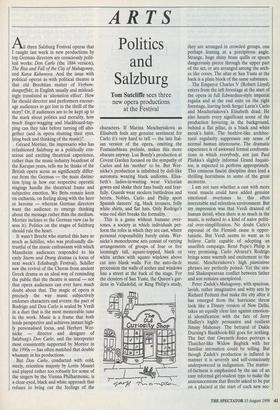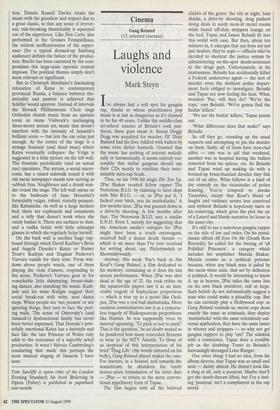ARTS
Politics and Salzburg
Tom Sutcliffe sees three new opera productions at the Festival AI three Salzburg Festival operas that I caught last week in new productions by top German directors are consciously polit- ical works: Don Carlo (the 1884 version), The Rise and Fall of the City of Mahagonny, and Katya Kabanova. And the issue with political operas as with political theatre is that old Brechtian matter of Verfrem- dungseffekt, in English usually and mislead- ingly translated as 'alienation effect'. How far should director and performers encour- age audiences to get lost in the thrill of the story? Or, if audiences are to be kept up to the mark about politics and morality, how much finger-wagging and blackboard-tap- ping can they take before turning off alto- gether (and in opera shutting their eyes, lying back and thinking of the music)?
Gerard Mortier, the impresario who has refashioned Salzburg as a politically con- scious and exciting theatrical experience, rather than the music industry beanfeast of the Karajan years, tells me he thinks of the British opera scene as significantly differ- ent from the German — the main distinc- tion lying in how our respective operatic stagings handle the theatrical frame and subjective emotion. We Brits remain keen on catharsis, on feeling along with the hero or heroine — whereas German directors want the audience to emerge thinking about the message rather than the medium. Mortier inclines to the German view (as he sees it). Politics on the stages of Salzburg should rule the heart.
It wasn't Brecht who started this hare so much as Schiller, who was profoundly dis- trustful of the manic enthusiasm with which Mannheim audiences responded to his early Sturm and Drang dramas (a focus of next week's Edinburgh Festival). Schiller saw the revival of the Chorus from ancient Greek drama as an ideal way of reminding the public that the theatre is unreal — not that opera audiences can ever have much doubt about that. The magic of opera is precisely the way music subjectively endorses characters and events: the pact of Rodrigo and Don Carlo is sealed by Verdi in a duet that is the most memorable tune in the work. Music is a frame that both lends perspective and achieves instant high- ly personalised focus, and Herbert Wer- nicke — director and designer of Salzburg's Don Carlo, and the interpreter most consistently supported by Mortier in the 1990s — has often matched that double whammy in his productions.
But Don Carlo, conducted with cold, steely, relentless majesty by Lorin Maazel and played rather too robustly for some of the singers by the Vienna Philharmonic, is a clear-eyed, black and white approach that refuses to bring out the feelings of the characters. If Marina Mescheriakova as Elisabeth feels any genuine sentiment for Carlo it's very hard to tell — the late Ital- ian version of the opera, omitting the Fontainebleau prelude, makes this more obscure anyway. Luc Bondy's production at Covent Garden focused on the sympathy of Carlos and his 'mother' to be. But Wer- nicke's production is inhabited by doll-like automata wearing black uniforms. Elisa- beth's ladies-in-waiting wear Victorian gowns and shake their fans busily and fear- fully. Guards wear modern battledress and berets. Nobles, Carlo and Philip sport Spanish dancers' rig, black trousers, frilly white shirts, and flat hats. Only Rodrigo's wine-red shirt breaks the formality.
This is a game without humane over- tones, a society in which individuals per- form the roles in which they are cast, where personal responsibility barely exists. Wer- nicke's monochrome sets consist of varying arrangements of groups of four or five loomingly tall, square-topped, black or white arches with square windows above cut into blank walls. For the auto-da-fe procession the walls• of arches and windows line a street at the back of the stage. For the cloisters of San Yuste, the Queen's gar- dens in Valladolid, or King Philip's study, they are arranged in crowded groups, one perhaps leaning at a precipitous angle. Strange, huge shiny brass quills or spears dangerously pierce through the upper part of the set, or are arranged among the arch- es like cones. The altar at San Yuste at the back is a plain block of the same substance.
The Emperor Charles V (Robert Lloyd) enters from the left forestage at the start of the opera in full Edwardian-style imperial regalia and at the end exits on the right forestage, leaving both Sergei Larin's Carlo and Mescheriakova's Elisabeth dead. He also haunts every significant scene of the production hovering in the background, behind a flat pillar, in a black and white monk's habit. The beehive-like architec- tural regularity suppresses any sense of normal human intercourse. The dramatic experience is of awkward formal confronta- tions in which everybody, not just Paul Plishka's slightly informal Grand Inquisi- tor, is expected to perform appropriately. This ominous fascist discipline does lend a thrilling horridness to some of the great moments.
I am not sure whether a cast with more vocal muscle could have added genuine emotional overtones to this often inscrutable and relentless environment. But my impression was that Verdi drained of human detail, when there is so much in the music, is reduced to a kind of naive politi- cal over-simplification. No doubt Carlo's espousal of the Flemish cause is oppor- tunistic. But Verdi seems to want us to believe Carlo capable of adopting an unselfish campaign. Rene Pape's Philip is very promising. Carlo Alvarez's Rodrigo brings some warmth and excitement to the music. Mescheriakova's high pianissimo phrases are perfectly poised. Yet the cen- tral Shakespearean conflict between father and son remains unexplored.
Peter Zadek's Mahagonny, with spacious, lavish, rather imaginative and witty sets by Richard Peduzzi that make the city after it has emerged from the hurricane threat look like a Disney version of New Delhi, takes an equally clear line against emotion- al identification with the fate of Jerry Hadley's highly persuasive and resilient Jimmy Mahoney. The betrayal of Dalde Duesing's Bankbook-Bill goes for nothing. The fact that Gwyneth tones portrays a Thatcher-like Widow Begbick with her familiar intonation could be telling. But though Zadek's production is inflated in manner it is severely and self-consciously underpowered in indignation. The matter- of-factness is emphasised by the use of an easy informal girl-student type to make the announcements that Brecht asked to be put on a placard at the start of each new sec- tion. Dennis Russell Davies treats the music with the grandeur and respect due to a great classic, so that any sense of irrever- ent, rule-breaking theatricality is squeezed out of the experience. Like Don Carlo, also performed in the Grosses Festspielhaus, the evident inoffensiveness of the experi- ence (for a typical dressed-up Salzburg audience) defines the failure of the produc- tion. Brecht has been castrated by the com- promises this large-scale operatic context imposes. The political themes simply don't seem relevant or significant.
But in Christoph Marthaler's fascinating relocation of Katya to contemporary provincial Russia, a balance between the- atricality and passion is achieved that Schiller would approve. Instead of intervals the Slovack Philharmonic Choir sings Orthodox church music from an upstairs room in Anna Viebrock's unchanging three-storey atrium set, music that doesn't interfere with the intensity of Janacek's brilliant score — but lets the ear relax just enough. At the centre of the stage is a strange fountain (and dead swan) where Katya eventually collapses: the Volga is suggested in a little picture on the left wall. The fountain periodically (and on sexual cue) ejaculates. The atrium, a social micro- cosm, has a raised sidewalk round it with old metal newspaper stands now serving as rubbish bins. Neighbours and a drunk wan- der round the stage. The left wall opens on to the bedroom of Jane Henschel's formidably vulgar, robust, roundly peasant- like Kabanicha. As well as a large modern bed, there are cupboards and ornaments and a telly that doesn't work when she vainly bashes it. There are surfaces to dust, and a vodka bottle with little schnapps glasses to which she regularly helps herself.
On the back wall is another huge cup- board through which David Kuebler's Boris and Angela Denoke's Katya or Rainer Trost's Kudrjas and Dagmar Peckova's Varvara vanish for their tryst. From win- dows above people watch, one of them playing the viola d'amore, responding to the score. Peckova's Varvara goes in for remarkable little shimmying, breast-shak- ing dances, also matching the music. Kudr- jash and his mate Kuligin suggest their social break-out with witty, neat dance steps. When people are 'not present' or are ignoring things, they turn to face the peel- ing walls. The sense of Ostrovsky's (and Janacek's) dysfunctional family has never been better expressed. That Denoke's pow- erfully emotional Katya has a hairstyle and face like the late Princess of Wales only adds to the resonance of a superbly acted production. It wasn't Sylvain Cambreling's conducting that made this perhaps the most musical staging of Janacek I have seen.
Tom Sutcliffe is opera critic of the London Evening Standard; his book Believing in Opera (Faber) is published in paperback next month.



























































 Previous page
Previous page